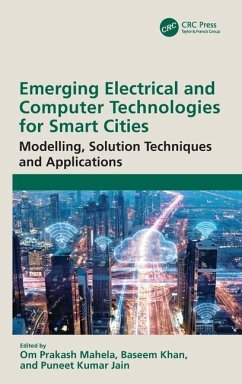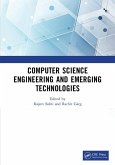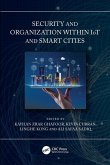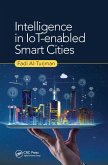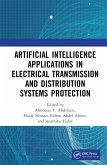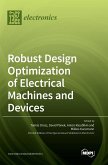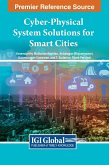Emerging Electrical and Computer Technologies for Smart Cities
Modelling, Solution Techniques and Applications
Herausgeber: Mahela, Om Prakash; Jain, Puneet Kumar; Khan, Baseem
Emerging Electrical and Computer Technologies for Smart Cities
Modelling, Solution Techniques and Applications
Herausgeber: Mahela, Om Prakash; Jain, Puneet Kumar; Khan, Baseem
- Gebundenes Buch
- Merkliste
- Auf die Merkliste
- Bewerten Bewerten
- Teilen
- Produkt teilen
- Produkterinnerung
- Produkterinnerung
This text discusses smart grid technologies including home energy management systems, demand management systems, source-side management systems and communication technologies for power supply management, and supervisory control and data acquisition.
Andere Kunden interessierten sich auch für
![Computer Science Engineering and Emerging Technologies Computer Science Engineering and Emerging Technologies]() Computer Science Engineering and Emerging Technologies66,99 €
Computer Science Engineering and Emerging Technologies66,99 €![Edison vs. Tesla_ Electrical Battles Edison vs. Tesla_ Electrical Battles]() Rafeal MechloreEdison vs. Tesla_ Electrical Battles20,99 €
Rafeal MechloreEdison vs. Tesla_ Electrical Battles20,99 €![Security and Organization within IoT and Smart Cities Security and Organization within IoT and Smart Cities]() Security and Organization within IoT and Smart Cities65,99 €
Security and Organization within IoT and Smart Cities65,99 €![Intelligence in IoT-enabled Smart Cities Intelligence in IoT-enabled Smart Cities]() Fadi Al-TurjmanIntelligence in IoT-enabled Smart Cities80,99 €
Fadi Al-TurjmanIntelligence in IoT-enabled Smart Cities80,99 €![Artificial Intelligence Applications in Electrical Transmission and Distribution Systems Protection Artificial Intelligence Applications in Electrical Transmission and Distribution Systems Protection]() Artificial Intelligence Applications in Electrical Transmission and Distribution Systems Protection221,99 €
Artificial Intelligence Applications in Electrical Transmission and Distribution Systems Protection221,99 €![Robust Design Optimization of Electrical Machines and Devices Robust Design Optimization of Electrical Machines and Devices]() Tamás OroszRobust Design Optimization of Electrical Machines and Devices83,99 €
Tamás OroszRobust Design Optimization of Electrical Machines and Devices83,99 €![Cyber-Physical System Solutions for Smart Cities Cyber-Physical System Solutions for Smart Cities]() Cyber-Physical System Solutions for Smart Cities283,99 €
Cyber-Physical System Solutions for Smart Cities283,99 €-
-
-
This text discusses smart grid technologies including home energy management systems, demand management systems, source-side management systems and communication technologies for power supply management, and supervisory control and data acquisition.
Hinweis: Dieser Artikel kann nur an eine deutsche Lieferadresse ausgeliefert werden.
Hinweis: Dieser Artikel kann nur an eine deutsche Lieferadresse ausgeliefert werden.
Produktdetails
- Produktdetails
- Verlag: CRC Press
- Seitenzahl: 388
- Erscheinungstermin: 3. Juli 2024
- Englisch
- Abmessung: 240mm x 161mm x 25mm
- Gewicht: 746g
- ISBN-13: 9781032392813
- ISBN-10: 1032392819
- Artikelnr.: 70151418
- Herstellerkennzeichnung
- Libri GmbH
- Europaallee 1
- 36244 Bad Hersfeld
- gpsr@libri.de
- Verlag: CRC Press
- Seitenzahl: 388
- Erscheinungstermin: 3. Juli 2024
- Englisch
- Abmessung: 240mm x 161mm x 25mm
- Gewicht: 746g
- ISBN-13: 9781032392813
- ISBN-10: 1032392819
- Artikelnr.: 70151418
- Herstellerkennzeichnung
- Libri GmbH
- Europaallee 1
- 36244 Bad Hersfeld
- gpsr@libri.de
Om Prakash Mahela received the Bachelor of Engineering degree from the College of Technology and Engineering, Udaipur, India, in 2002, and the Master of Technology degree from Jagannath University, Jaipur, India, in 2013, and received the Ph.D. degree from Indian Institute of Technology Jodhpur, India, in 2018, all in electrical engineering. He received degree of Master of Business Administration (Human Resource Management) from the Indira Gandhi National Open University, New Delhi, India in 2021. From 2002 to 2004, he was an Assistant Professor with the Rajasthan Institute of Engineering and Technology, Jaipur, India. From 2004 to 2014, he was a Junior Engineer with the Rajasthan Rajya Vidyut Prasaran Nigam Ltd., India, Assistant Engineer from February 2014 to February 2023 and Executive Engineer since March 2023 with same organization. He has authored more than 260 research publications in top-tier journals, conferences and edited books. He has edited 5 books. He performed more than 300 reviews for the prestigious journals of IEEE, Elsevier, Springer, Willey and Taylor & Francis. His research interest includes power quality, power system planning, grid integration of renewable energy sources, FACTS devices, transmission line protection, electric vehicles, and condition monitoring. He was a recipient of the University rank certificate in 2002, Gold Medal in 2013, Best Research Paper Award in 2018, C.V. Raman Gold Medal in 2019, Senior Professional Engineer Award in 2021 and State level merit Certificate in 2023 for meritorious performance in the Department. He has been included in the top 2% Scientists worldwide in 2021 and 2022 in the list published by Stanford University, USA. He also received the certificates of outstanding contribution in the reviewing from Computer & Electrical Engineering, International Journal of Electrical Power & Energy Systems, Measurement, and Renewable & Sustainable Energy Reviews. He is a Senior Member of the IEEE. Baseem Khan received his Bachelor of Engineering degree in Electrical Engineering from the Rajiv Gandhi Technological University, Bhopal, India in 2008. He received his Master of Technology and Doctor of Philosophy degrees in Electrical Engineering from the Maulana Azad National Institute of Technology (MANIT), Bhopal, India, in 2010 and 2014, respectively. Currently, he is working as an Assistant Professor in the School of Electrical and Computer Engineering, Hawassa University Institute of Technology, Hawassa University, Hawassa, Ethiopia. His research interest includes power system restructuring, power system planning, smart grid technologies, meta-heuristic optimisation techniques, reliability analysis of renewable energy system, power quality analysis and renewable energy integration. He has published 5 edited books and more than 100 research publications in top-tier journals and conferences. He is also a member of IEEE and IEEE PES. Puneet Kumar Jain received the Bachelor of Engineering degree in Computer Science and Engineering from Engineering College Bikaner, India in the year 2009, and Master of Technology degree in Information Technology from Delhi Technological University, Delhi, India in the year 2011, and PhD degree in Centre for Information and Communication Technology from Indian Institute of Technology Jodhpur in the year 2018. He is currently working as an Assistant Professor in the Department of Computer Science and Engineering at National Institute of Technology Rourkela, Odisha, since 2020. Earlier, he has served as an Assistant Professor at The LNM Institute of Technology, Jaipur and Jaypee University of Information Technology, Solan (H.P). He has research interest in the field of Biomedical Engineering where his research focuses on healthcare technology and algorithm development, aiming to advance patient diagnosis, assessment and treatment. His area of research interest also includes Image processing, Time-frequency analysis, and Machine Learning. He has published his research work in peer reviewed and SCI indexed International Journals and Conferences. He is also a reviewer for various renowned International journals including Biomedical Signal Processing and Control (ELSEVIER), Computers in Biology and Medicine (ELSEVIER), Health and Policy (ELSEVIER), and various international conferences. He also received the certificates of outstanding contribution in the reviewing from the Biomedical Signal Processing Control, ELSVIER Journal. He has served as member of organising committee and session chair in international conferences I3CS-2021, PDGC-2016, ISPCC-2017, and ICIIP-2017, and also in International workshops IWMA-2019 and IWMA-2020.
1. Introduction. 2. Overview of Recent Practices of Smart City Projects. 3.
Comprehensive Overview of Cyber Security for Smart Cities. 4. Cyber
Security Issues and Solutions for Smart Power Network. 5. Recent Trends on
Artificial Intelligence Applications for Smart Cities: A Review. 6.
Peregrination of VANETs for smart cities: Opportunities, and Upcoming
research directions. 7. Urban Smart Parking System: A Taxonomical Approach.
8. Machine Learning Approaches in Financial Management of Smart Cities. 9.
Traffic Control Mechanism Using IoT Technologies and Applications for Smart
Cities: LoRaWAN Perspective. 10. Internet of medical things for
self-monitoring of vital parameters. 11. Review of Renewable Energy
Technologies in Smart Cities. 12. Optimal Placement of Distributed Energy
Generators Using Multi-objective Harmony Search Algorithm for Loss
Reduction in Micro-grid for Smart Cities. 13. Integrated Control of
Microgrid with Vehicle to Grid Technology to Regulate Frequency in Smart
City Power Network. 14. Comprehensive Overview of Utility Network
Technologies for Smart Cities. 15. Smart Power Quality Monitoring System
for Smart Cities. 16. Smart Protection Scheme for Smart City Transmission
Feeder Using K-Means Clustering. 17. Study of Time-Frequency Features for
Cardiovascular System. 18. Multi-domain Features for Emotion Recognition
using EEG signals. 19. Exploration of Impactful Brain Region and EEG Bands
for Affective Computing.
Comprehensive Overview of Cyber Security for Smart Cities. 4. Cyber
Security Issues and Solutions for Smart Power Network. 5. Recent Trends on
Artificial Intelligence Applications for Smart Cities: A Review. 6.
Peregrination of VANETs for smart cities: Opportunities, and Upcoming
research directions. 7. Urban Smart Parking System: A Taxonomical Approach.
8. Machine Learning Approaches in Financial Management of Smart Cities. 9.
Traffic Control Mechanism Using IoT Technologies and Applications for Smart
Cities: LoRaWAN Perspective. 10. Internet of medical things for
self-monitoring of vital parameters. 11. Review of Renewable Energy
Technologies in Smart Cities. 12. Optimal Placement of Distributed Energy
Generators Using Multi-objective Harmony Search Algorithm for Loss
Reduction in Micro-grid for Smart Cities. 13. Integrated Control of
Microgrid with Vehicle to Grid Technology to Regulate Frequency in Smart
City Power Network. 14. Comprehensive Overview of Utility Network
Technologies for Smart Cities. 15. Smart Power Quality Monitoring System
for Smart Cities. 16. Smart Protection Scheme for Smart City Transmission
Feeder Using K-Means Clustering. 17. Study of Time-Frequency Features for
Cardiovascular System. 18. Multi-domain Features for Emotion Recognition
using EEG signals. 19. Exploration of Impactful Brain Region and EEG Bands
for Affective Computing.
1. Introduction. 2. Overview of Recent Practices of Smart City Projects. 3.
Comprehensive Overview of Cyber Security for Smart Cities. 4. Cyber
Security Issues and Solutions for Smart Power Network. 5. Recent Trends on
Artificial Intelligence Applications for Smart Cities: A Review. 6.
Peregrination of VANETs for smart cities: Opportunities, and Upcoming
research directions. 7. Urban Smart Parking System: A Taxonomical Approach.
8. Machine Learning Approaches in Financial Management of Smart Cities. 9.
Traffic Control Mechanism Using IoT Technologies and Applications for Smart
Cities: LoRaWAN Perspective. 10. Internet of medical things for
self-monitoring of vital parameters. 11. Review of Renewable Energy
Technologies in Smart Cities. 12. Optimal Placement of Distributed Energy
Generators Using Multi-objective Harmony Search Algorithm for Loss
Reduction in Micro-grid for Smart Cities. 13. Integrated Control of
Microgrid with Vehicle to Grid Technology to Regulate Frequency in Smart
City Power Network. 14. Comprehensive Overview of Utility Network
Technologies for Smart Cities. 15. Smart Power Quality Monitoring System
for Smart Cities. 16. Smart Protection Scheme for Smart City Transmission
Feeder Using K-Means Clustering. 17. Study of Time-Frequency Features for
Cardiovascular System. 18. Multi-domain Features for Emotion Recognition
using EEG signals. 19. Exploration of Impactful Brain Region and EEG Bands
for Affective Computing.
Comprehensive Overview of Cyber Security for Smart Cities. 4. Cyber
Security Issues and Solutions for Smart Power Network. 5. Recent Trends on
Artificial Intelligence Applications for Smart Cities: A Review. 6.
Peregrination of VANETs for smart cities: Opportunities, and Upcoming
research directions. 7. Urban Smart Parking System: A Taxonomical Approach.
8. Machine Learning Approaches in Financial Management of Smart Cities. 9.
Traffic Control Mechanism Using IoT Technologies and Applications for Smart
Cities: LoRaWAN Perspective. 10. Internet of medical things for
self-monitoring of vital parameters. 11. Review of Renewable Energy
Technologies in Smart Cities. 12. Optimal Placement of Distributed Energy
Generators Using Multi-objective Harmony Search Algorithm for Loss
Reduction in Micro-grid for Smart Cities. 13. Integrated Control of
Microgrid with Vehicle to Grid Technology to Regulate Frequency in Smart
City Power Network. 14. Comprehensive Overview of Utility Network
Technologies for Smart Cities. 15. Smart Power Quality Monitoring System
for Smart Cities. 16. Smart Protection Scheme for Smart City Transmission
Feeder Using K-Means Clustering. 17. Study of Time-Frequency Features for
Cardiovascular System. 18. Multi-domain Features for Emotion Recognition
using EEG signals. 19. Exploration of Impactful Brain Region and EEG Bands
for Affective Computing.

